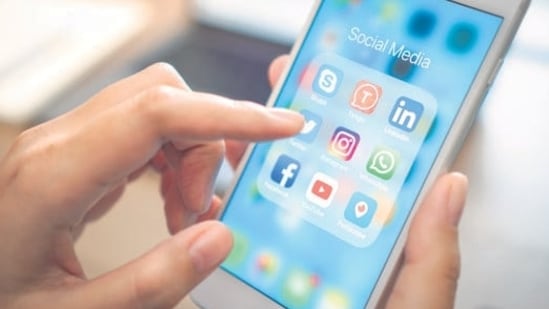Staying glued to social media and keeping track of constant flow of information can negatively impact brain.
Social media gives you a sense of staying connected to your loved ones all the time and helps overcome loneliness in times when no one is around. However, despite its power to help people stay in touch with each other at the click of a button or the touch of a finger, its limitations and harmful effects may outweigh its benefits. Considering, the world of social media can be presented in a way that it seems more attractive than the real life, it can have detrimental effect on people with low esteem or disorders like depression and anxiety. Besides, one may connect less in real life if they get used to socialising on internet, giving them a false feeling of keeping in touch. Not meeting people in real life can take a toll on mental health and lead to loneliness, anxiety, depression and related issues. (Also read: What is a ‘dopamine detox’ and how can it improve your mental health? Know from mental health experts)

Staying glued to social media and keeping track of constant flow of information may also negatively impact brain. In fact, tendency to surf or scroll through bad news, even though it is saddening, disheartening, or depressing, is termed as doom scrolling or doom surfing. During Covid times, this became more common when people tracked news related to virus and there were frequent developments.
Aanandita Vaghani, Mental Health Counsellor, Founder, UnFix Your Feelings in an interview with HT Digital shed light on ways social media and doomscrolling can impact mental health.
NEGATIVE IMPACT OF SOCIAL MEDIA ON MENTAL HEALTH
1. It’s making you less body-positive
The type of social media consumed by women especially, can really impact their perceptions of their bodies. In a ‘filtered’ age where body ‘perfection’ rather than body positivity or neutrality is emphasized, women may have worse thoughts about themselves especially if they have low self esteem and a history of an eating disorder as they compare themselves to individuals that may have edited or idealized not eating.
2. It’s reducing your real-world connections
When individuals have heavy social media use, studies show that this leads them to feel less socially connected. In a study published by the Canadian Journal of Behavioral Science, passive engagement with social media that involved not posting, but only viewing people’s posts was associated with lower efforts to seek social connection, reduced well-being, and higher stress.
3. It’s impacting you the same way that drugs do
Neuroscientists that study the effects of social media on the brain find that positive interactions (such as someone liking your tweet) trigger the same kind of chemical reaction that is caused by gambling and the use of recreational drugs. This is because when you get a social media notification, your brain sends a chemical messenger known as dopamine along a reward pathway, which makes you feel ‘happy’.
The release of dopamine is associated with food, exercise, love, sex, gambling, drugs and social media. Scrolling on social media, just like drugs and food provides immediate rewards — in the form of attention from your network — for minimal effort through a quick thumb tap. Therefore, the brain rewires itself, making you further desire likes, retweets, and comments.
4. It is increasing your sensitivity to developing an attentional challenge
It is a well-researched fact that those with Attention Deficit Hyperactivity Disorder (ADHD) face a need for constant stimulation and have lower self-control. The overuse of social media and lack of moving their bodies makes such individuals reduce their inhibitive tendencies further, which leads to even more screen time, building a cycle that is difficult to get out of.
For those who don’t yet, or don’t have a diagnosis of ADHD, social media can still significantly decrease attention span. This shortened life span has begun to control most of our life – whether it be during a long book or movie, we tend to reach out to our phones involuntarily to momentary boredom.
5. It increases the risk of depression and loneliness
As we check ‘stories’ or posts, we may worry about missing an event, an inside joke, or something that makes you feel left out. The human need to belong is so strong, that continuously feeling like this can make you develop an increased sense of loneliness or exclusion as we see people having a good time- which might only be one second of their life’s highlight reel.
Catch your daily dose of Fashion, Health, Festivals, Travel, Relationship, Recipe and all the other Latest Lifestyle News on Hindustan Times Website and APPs
This post was originally published on this site be sure to check out more of their content







